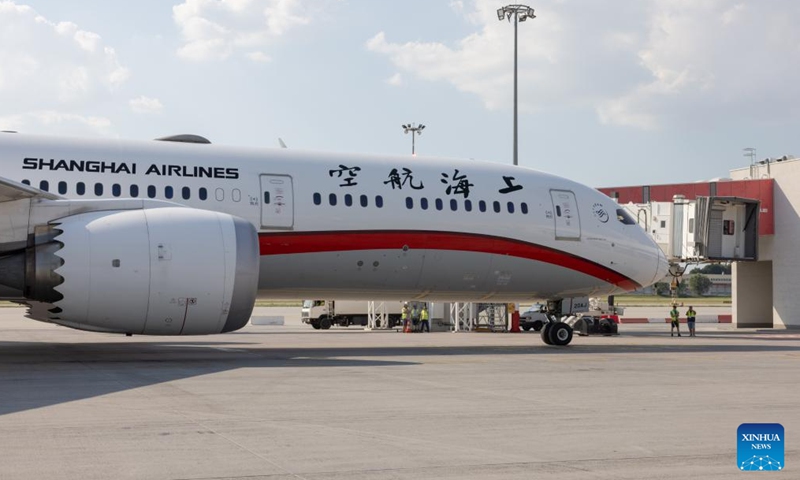
An aircraft from Xi'an, capital of northwest China's Shaanxi Province, arrives at Budapest Ferenc Liszt International Airport in Budapest, Hungary, June 29, 2024. Direct flights between Xi'an, capital of northwest China's Shaanxi Province, and Budapest resumed on Saturday.
Chinese airlines are ramping efforts to launch more international routes for the summer travel season, with flights to Europe becoming a rising source of traffic. Industry data showed that Chinese airlines have taken a majority of the market share in terms of current China-Europe routes.
On Tuesday, China Eastern Airlines launched a direct flight from Shanghai to Marseille, France, carrying 242 passengers.
With the launch of this flight, regular direct passenger routes have been opened for the first time between China and southern France, and China Eastern will operate 19 routes and 244 flights (round trip) every week in the European region, the airlines said.
China Eastern is not alone. Europe has become a hot market for Chinese airlines seeking new routes, and some carriers even said their overseas flights in summer are expected to exceed the level of the same period in 2019.
On Thursday morning, a plane carrying 213 passengers operated by China Southern Airlines began its maiden flight from Guangzhou, South China's Guangdong Province to Budapest, Hungary.
The new route means China Southern now operates 53 international routes departing from Guangzhou, including 11 routes to Europe.
On June 16, Air China said that it will launch and resume 13 international routes including launching the Beijing-Dhaka and Chengdu-Milan routes.
In terms of the European market, Air China said it is one of the key carriers between China and Europe, with a market share of over 28 percent. Europe is also the region where Air China has the largest international capacity deployment, with 32 routes and 53 daily flights between China and Europe, exceeding the 2019 level by 116 percent.
Chinese airlines have taken a majority of the market share in terms of current China-Europe routes, per industry data.
Industry data from CADAS sent to the Global Times on Tuesday showed that as of June this year, the recovery rate of domestic airlines on the China-Europe route has reached 112.8 percent, compared with 43.2 percent of foreign airlines.
In terms of flight volume share, Chinese carriers on the China-Europe routes accounted for 73.9 percent.
Notably, there has been no significant change from before the COVID-19 pandemic in terms of market share between respective carriers from the two regions.
Some European airlines told the Global Times that they are facing delays in aircraft delivery due to component production and supply chain issues, which to some extent has affected the recovery speed of international routes for some players.
In addition, the slow recovery of European airlines on China-Europe routes is also related to the need to bypass Russian airspace, which increases flight time and costs, according to market watchers.
Market watchers said the rising capacity of the China-Europe market is also a reflection of the Civil Aviation Administration of China's ambition outlined earlier this year, as the regulator vowed to resume 80 percent of international routes this year, while some airlines have said that their recovery pace is faster than the target.
China's civil aviation achieved a rapid recovery of domestic flights in 2023, while its next goal is speeding up the recovery of international flights, especially from Beijing, Shanghai and Guangzhou, and this summer will be a critical period for the full recovery of Chinese airlines, Zhu Xiaohan, a senior analyst from CADAS, told the Global Times on Tuesday.
Market watchers said the efforts made by Beijing, such as the unilateral visa-free policy for citizens from many countries to visit China adopted in recent months, is also helping boost the flying capacity for airlines.
In a latest example, China's Foreign Ministry said on June 25 that it will extend its visa-free policy to New Zealand, Australia and Poland.
According to the National Immigration Administration, the number of foreigners coming to China in the first quarter of this year more than tripled compared with the same period in 2023.




